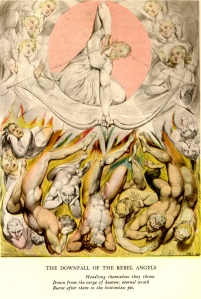
I’m currently obsessed with John Milton’s wildly original On the Morning of Christ’s Nativity from his official debut as a poet from 1645 — in particular, its juxtaposition of the birth of Jesus and the demise of the old order (and its anticipations of Auden):
The Oracles are dumb;
No voice or hideous hum
Runs through the arched roof in words deceiving.
Apollo from his shrine
Can no more divine,
With hollow shriek the steep of Delphos leaving.
No nightly trance or breathed spell
Inspires the pale-ey’d priest from the prophetic cell.
The lonely mountains o’er,
And the resounding shore,
A voice of weeping heard and loud lament;
From haunted spring, and dale
Edg’d with poplar pale,
The parting Genius is with sighing sent;
With flow’r-inwoven tresses torn
The Nymphs in twilight shade of tangled thickets mourn.
In consecrated earth,
And on the holy hearth,
The Lars and Lemures moan with midnight plaint;
In urns and altars round,
A drear and dying sound
Affrights the flamens at their service quaint;
And the chill marble seems to sweat,
While each peculiar power forgoes his wonted seat.


